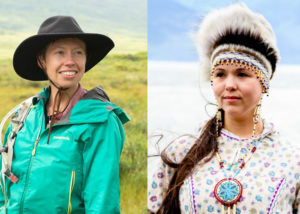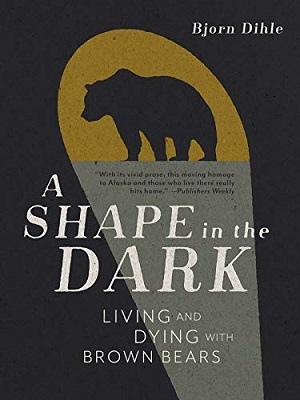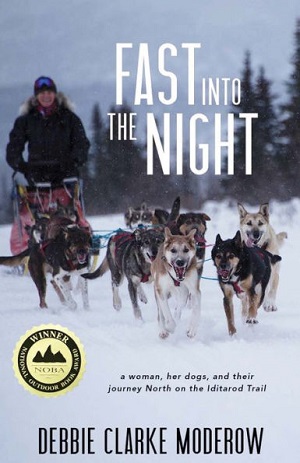ENJOY OUR GEOGRAPHY OF HOPE SERIES
Photo Credit: Florian Schulz
Alaska Wilderness League's Geography of Hope series is a collection of virtual events and experiences connecting you to writers, photographers, experts, filmmakers and other wild Alaska advocates in a celebration of the lands, waters, wildlife and cultures we all care so deeply about. You can find our complete Geography of Hope playlist on YouTube, and don't forget to subscribe to our channel while you're there!
Our intent is to lift your spirits, to mentally transport you to the temperate forests and tundra and majestic points in between and, we hope, leave you inspired and feeling connected to others who share a passion about our nation's wildest places and re-energized in the fight to protect them.
We will continue to introduce more events to this series, including some exclusive sessions available to contributing members. As always, feel free to reach out to membership@alaskawild.org with any questions.
Upcoming Geography of Hope Episodes:
March 26, 2024: Nunavut Qanemciput: Our Land, Our Stories: Connecting Youth with Alaska Native Strengths and Culture
RSVP here

In fall 2022, Alaska Wilderness League was pleased to announce Polly as the inaugural recipient of its Adam Kolton Alaska Storytelling Grant. She will kick off our Geography of Hope season with “Nunavut Qanemciput: Our Land, Our Stories: Connecting Youth with Alaska Native Strengths and Culture.”
Originally from the Cup'ik coastal village of Chevak, Polly is a Learning & Development Advisor with Family Wellness Warriors. She has created space where at-risk and institutionalized youth can engage in Alaska Native strengths and culture through song, dance, story and Indigenous values exercises. In this special Geography of Hope episode, Polly joins us to share Cup'ik song and story, and to share the ways the League's storytelling grant has opened the door to youth connecting with their own cultural strengths.
Polly spent her earliest years on the tundra and on the silty winding rivers of the Yukon Kuskokwim Delta Region living a life that was very rich in cultural knowledge and subsistence. She met her father later in life, when he flew his Cessna 170 into her tiny village and from this, Polly began to experience connectedness with the land under a western lens. Today, she will often weave those two viewpoints in storytelling and trainings.
April 23: My journey with the Diomede Tribe with Bjorn Olson
RSVP coming soon!
Alaskan adventurer and filmmaker Bjorn Olson will showcase his ongoing film project about the Native Tribe of Diomede and include an exclusive trailer for the film. This project stems from a 2019 invitation from the tribe to make a film about how climate change is affecting this Bering Strait community, and his work on the film continues today. In 2023, Bjorn was awarded the Alaska Wilderness League Adam Kolton Alaska Storytelling Grant to support the continued development of this film. Learn about the challenges this community is facing in a rapidly changing world and about the difficulties of making a film in one of the most remote villages in North America.
Coming in May: Exploring Wilderness: From Heart Racing Adventure to Tranquility with author John Rust
What would you do if a grizzly approached your tent during a rainstorm in Denali National Park? Join author John Rust as he takes us on an Alaskan journey that includes highlights from the Alaskan Peninsula, Denali, Katmai and the Tongass National Forest. John will share breathtaking images and read excerpts from his book “Exploring Wilderness: From Heart Racing Adventure to Tranquility” to thrill us with images and stories of his time kayaking and backpacking in the Alaskan backcountry.
John Rust has spent a lifetime exploring and living in earth’s most wild places: pristine and primeval areas where both predator and prey exist. He has hiked and paddled the wilds of Alaska over two dozen times including backpacking Denali National Park, kayaking near tide water glaciers in Kenai Fjords National Park, exploring Katmai’s desolate “Valley of 10,000 Smokes,” and paddling Katmai's backcountry and Admiralty Island’s “Fortress of the Bears.”
Enjoy our Past Geography of Hope Episodes:
June 15, 2023: The Wanderer: An Alaska Wolf's Final Journey with author Tom Walker
Watch here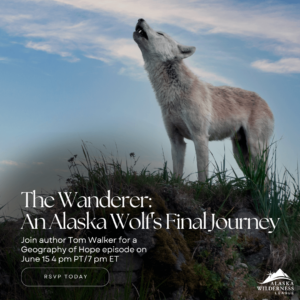
Join Tom Walker, author of The Wanderer: An Alaska Wolf's Final Journey, and Alaska Wilderness League for this installment of our Geography of Hope series. You'll learn about the remarkable journey of Wolf 258, who traveled more than 2700 miles in less than six months, and what it tells us about this iconic species more broadly.
Through the lens of one wolf’s epic journey, Walker highlights connections to terrain, history, looming threats, and other animals. He recounts the animal’s compelling final months, while examining the broader complexity of the species’ struggle for survival. The Wanderer explores not only the natural history of wolves but the relationship of people--Indigenous, pioneers and settlers, biologists, politicians--with this predator, shedding light on the long-established northern traditions of trapping and hunting, the tangled politics of wolf management, and how artificial borders fail to contain this iconic species.
TOM WALKER has been a rodeo hand, horse packer in the Sierra Nevada, Alaska wildlife conservation technician, pilot, wilderness guide, loghome builder, and documentary film advisor. A photographer and writer, he is the author of more than a dozen books centered on Alaska, including Wild Shots, Alaska Wildlife, and The Seventymile Kid. His work has been featured in Alaska Magazine, Field and Stream, Readers’ Digest, Newsweek, Audubon, Sierra, and more. Living in Alaska for more than five decades, Walker resides in a log house near Denali National Park. Find him online at tomwalkerphotography.com.
May 23, 2023: Hidden Wonders of the Western Arctic with photographer Peter Mather
Watch the recording here
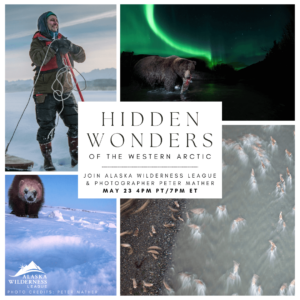
Join Alaska Wilderness League and world-renowned photographer Peter Mather on May 23 4 p.m. PT/7 p.m. ET for a visual journey as he chases elusive wildlife through the Arctic. Amidst stories about the Porcupine caribou herd, wolverines, Arctic foxes and bears that travel north in spring, Peter will pair first-hand stories with his world-class images that never disappoint. Peter has spent over a decade photographing hidden wonders that – despite regions inadequately named the “National Petroleum Reserve-Alaska” – make the Arctic such a unique and special region. This online event is part of our Geography of Hope virtual series.
About the photographer and speaker: Peter Mather loves (in order) soccer, photography, McDonald's and living healthy. His photo stories revolve around life in the North with a focus on wildlife and community culture. He is a fellow with the International League of Conservation, a Lumix Ambassador and represented by National Geographic Image Collection. You can follow his photography and peculiar humor on Instagram at @matherpeter.
May 2, 2023: On Heaven’s Hill: The power of story in protecting wild spaces with author Kim Heacox
Watch the recording here
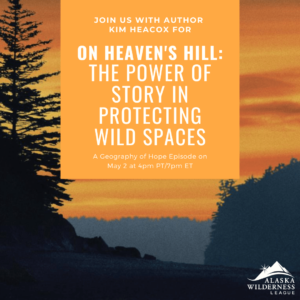
Join Alaska Wilderness League and author Kim Heacox as he talks about using the power of story – in both fiction and non-fiction – to address some of Alaska’s most vexing conservation issues. Specifically, Kim will focus on the rain-soaked, shaggy green, ice-cut world of Southeast Alaska, the Tongass National Forest, and the salmon-eating wolves that live there. He’ll share readings from his exciting new novel, On Heaven's Hill, and from his opinion pieces in The Guardian.
Kim first came to Alaska in 1979 as a ranger with the National Park Service. A freelance writer for forty years, he has authored more than a dozen books, five of them published by National Geographic. Author Lynne Spreen describes On Heaven's Hill as “A dazzling tale of a young girl, a desperate father, and a silver wolf caught in the middle of a battle between an Alaska band of war veterans and corrupt land developers. Another compelling read from the author of Jimmy Bluefeather and The Only Kayak.” Author Kimi Eisele says On Heaven's Hill “is the kind of story the world needs right now.” Kim will also discuss his Guardian pieces on wolves, and the colorful responses he’s received.
March 29, 2023: VICTORIOUS: THE MAGIC OF BRISTOL BAY with filmmaker Mark Titus
Watch the recording here
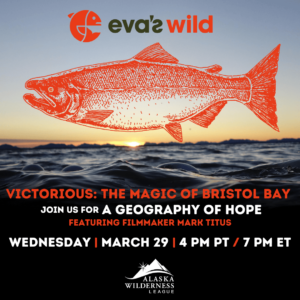
Join Alaska Wilderness League and filmmaker Mark Titus for a virtual celebration of our recent victory protecting Bristol Bay from the proposed Pebble Mine! Enjoy vibrant videos, images and stories about what it means to be connected to this magical region and its salmon.
Titus worked in the Alaska salmon industry for 25 years and then turned his passion to protecting the wild salmon of Bristol Bay from the threat of Pebble Mine. Salmon might be considered the lifeblood of Alaska, and in this Geography of Hope episode, breathtaking snapshots of Bristol Bay will reveal deep relationships between people and the land. Fall in love with wild Alaska as we also explore a larger, global question highlighted in Titus' film The Wild: How do we reconcile the Western world's human separation from the natural world that sustains us – and if we can change course – how do we save the wild that remains? Wild salmon show us how to give of ourselves for that which is far greater than ourselves, and our success in protecting Bristol Bay offers renewed hope that our efforts can leave future generations with a world that sustains them.
January 24, 2023: Beauty within the Beast: Secrets of Living in Harmony with Bears with Stephen F. Stringham, PhD
Watch here
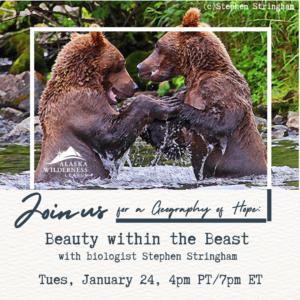
Join us on at 4 p.m. PT/7 p.m. ET with conservation biologist Stephen Stringham as he shares highlights and spectacular photos from half a century of living with Alaska's bears. Stephen describes his stories as a blend of “high adventure, low humor and fascinating science.” Some stories will make you rock with laughter, others are the stuff of nightmares. Hear of sublime encounters including with a female grizzly in heat who anointed Steve's clothing with her God-given perfume, or when a mother grizzly brought her cubs over to Steve, then lay down beside him to nurse the cub and to nap. We are sure you will love this event chock full of imagery – stunning photos, beautiful photo-paintings and engaging video.
About the Speaker: Steve completed his Masters in Science degree studying moose behavior, and his Doctor of Philosophy studying the behavior and ecology of bears – the subject to which most of his professional career has been devoted. Although he has worked in Europe and many parts of North America, most of his career has been spent in Alaska.
October 18, 2022: Caribou Across North America: Stories from the Land
View the show here
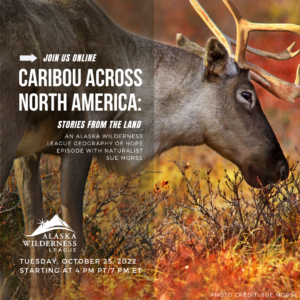 From the Atlantic Ocean to Alaska's coastal plain (including arctic islands, mountains, boreal forests, and open tundra) Sue Morse has tracked, studied, and photographed caribou and their remarkable diversity of habitats for over 15 years. Sue's stories are illustrated with her own photos that she has taken throughout some of the most remote habitats in North America, where she has patiently endeavored to get close to caribou and their wild neighbors including polar bears, musk oxen, arctic foxes, ptarmigan and wolves.
From the Atlantic Ocean to Alaska's coastal plain (including arctic islands, mountains, boreal forests, and open tundra) Sue Morse has tracked, studied, and photographed caribou and their remarkable diversity of habitats for over 15 years. Sue's stories are illustrated with her own photos that she has taken throughout some of the most remote habitats in North America, where she has patiently endeavored to get close to caribou and their wild neighbors including polar bears, musk oxen, arctic foxes, ptarmigan and wolves.
Her stories share a mix of humor, adventure, and advocacy, engaging us all to contemplate the full significance of caribou and the vast wilderness landscapes these animals embody. Sue's journeys across North America culminate with her stunning photos and stories recalling multiple trips to Alaska's wildlands. As Sue puts it, “Alaska's precious wildlands are, indeed, a vital and inspiring geography of hope that should be completely protected and cherished by us all.”
About the speaker:
Susan Morse is a nationally known naturalist, professional wildlife tracker and founder of Keeping Track® (KeepingTrack.org), an organization dedicated to wildlife conservation and citizen science at the grassroots level. Sue's 46 years of field research – monitoring and interpreting the habitat uses of selected wide-ranging mammals – has focused on puma, black bear, bobcat, Canada lynx, fisher and caribou. Her work has been featured on National Public Radio's Morning Edition, and in numerous publications, including Smithsonian, Audubon, Wild Earth and Amicus Journal.
June, 2022: Alaska Adventure 55 Ways
Watch the episode here
Adventure along with authors of Alaska Adventure 55 Ways, John Wolfe Jr. and Rebecca Wolfe, to enjoy breathtaking hikes, boating adventures, and even a growing sport that involved wild-frozen-water-skating.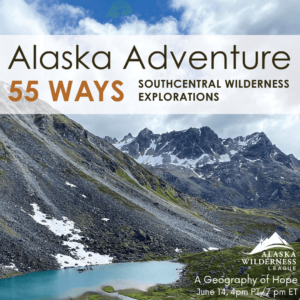
Originally published in 1972, the classic guide known as "55 Ways to the Wilderness in Southcentral Alaska" has been fully updated and reinvented to explore favorite activities for year-round fun, from quick day trips to adventures that could extend to a week or longer, including canoe trails, wilderness cabins, easy summits, forest walks, cross-country ski routes, summer mountain biking and winter fat bike trails, wild skating, and more.
John Wolfe Jr. and Rebecca Wolfe, a father-daughter team, describe activities spanning the broad swath of Southcentral Alaska, 300 miles north to south and 350 miles east to west. From lakes and peaks of the Kenai Peninsula, the Anchorage front range, to the Matanuska and Susitna Valleys, the Copper River basin, Chugach and Denali State Parks, Chugach National Forest, Kenai Fjords and Wrangell St. Elias National Parks, you can learn about several wildlife refuges and portions of the Iditarod National Historic Trail. With an emphasis on adventures regular people can enjoy and destinations that don’t require highly technical skills, expensive flights to remote locations, or demanding levels of athletic fitness, we hope to have a conversation that appeals to all ages.
May 10, 2022: Finding True North with Molly Rettig
Watch the episode here
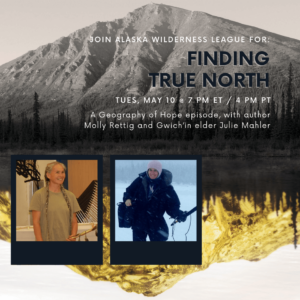 Molly's book takes readers on a journey back in time to show what Alaska was like before the gold rush, then retraces the resource booms that reshaped the state forever. Told through the voices of living elders, the story follows the gold rush, World War II and the oil pipeline boom, exploring the many ways we use resources and how they ultimately define and unite us. In this Geography of Hope episode, Molly will be joined by Gwich'in elder Julie Mahler, who was born and raised in Fort Yukon, to discuss the stories and themes of the book.
Molly's book takes readers on a journey back in time to show what Alaska was like before the gold rush, then retraces the resource booms that reshaped the state forever. Told through the voices of living elders, the story follows the gold rush, World War II and the oil pipeline boom, exploring the many ways we use resources and how they ultimately define and unite us. In this Geography of Hope episode, Molly will be joined by Gwich'in elder Julie Mahler, who was born and raised in Fort Yukon, to discuss the stories and themes of the book.
Molly Rettig is a former reporter at the Fairbanks Daily News-Miner. She covered the Yukon Quest International Sled Dog Race for Alaska Public Radio, is a regular contributor to Alaska magazine, and is a science writer at the Cold Climate Housing Research Center. She lives in Fairbanks with her husband Josh and their two daughters.
Julie Mahler is the daughter of Cliff Fairchild and Margaret Cadzow. She and her late husband, Gene Mahler, homesteaded along the Salmon Fork of the Black River, about 80 miles above Chalkyitsik, hunting, trapping and living off the land. They raised six children there, passing on the values of hard work, self-sufficiency and respect for the land. Julie works with the U.S. Fish and Wildlife Service and the Council of Athabascan Tribal Governments to organize camps for children across Alaska, teaching traditional skills like trapping muskrats, snaring rabbits and tanning hides. She has been an active defender of the Arctic National Wildlife Refuge and other traditional subsistence lands.
April 27, 2022: Chatting "Newtok" and Climate Justice with Patagonia
Watch the episode here
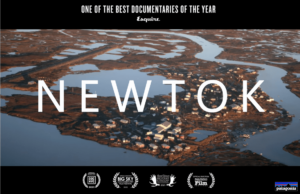 Join us for an extra special Geography of Hope conversation with the filmmakers behind the movie "Newtok." This powerful film shares the story of Newtok, Alaska, whose residents are being confronted by the realities of climate change. To keep their culture and community intact, Newtok's 360 Yup’ik residents must relocate their entire village to stable ground upriver.
Join us for an extra special Geography of Hope conversation with the filmmakers behind the movie "Newtok." This powerful film shares the story of Newtok, Alaska, whose residents are being confronted by the realities of climate change. To keep their culture and community intact, Newtok's 360 Yup’ik residents must relocate their entire village to stable ground upriver.
Water will soon erase Newtok. Built on a delta at the edge of the Bering Sea, the tiny Yup’ik village has been dealing with melting permafrost, river erosion and decaying infrastructure for decades, and in moving their village, they will become some of America’s first climate change refugees. Enjoy a special viewing of this film focused on a village seeking justice in the face of climate disaster, and then stick around for our Geography of Hope episode with filmmakers from our corporate partner, Patagonia!
March 29, 2022: From the World of Film and Television to Defending the Sacred: The Importance of Indigenous Representation with Princess Daazhraii Johnson
Watch the episode here
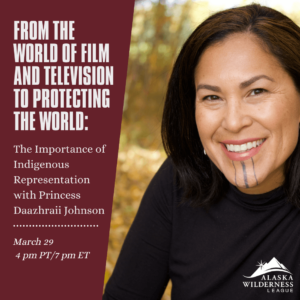 Join us for a conversation with Princess Daazhraii Johnson, a Neets'aii Gwich'in writer, director, producer, actor and advocate. We will discuss inclusion and representation through storytelling, her new short film and her hit PBS show, “Molly of Denali.” We’ll hear about Princess’ inspiration for the show and get her perspective on human interaction with plants, animals, and the land and waters that we all depend upon. And we’ll discuss why seeking out and elevating these perspectives is so critical if we hope to achieve more diverse and inclusive conversations about conserving our wild places.
Join us for a conversation with Princess Daazhraii Johnson, a Neets'aii Gwich'in writer, director, producer, actor and advocate. We will discuss inclusion and representation through storytelling, her new short film and her hit PBS show, “Molly of Denali.” We’ll hear about Princess’ inspiration for the show and get her perspective on human interaction with plants, animals, and the land and waters that we all depend upon. And we’ll discuss why seeking out and elevating these perspectives is so critical if we hope to achieve more diverse and inclusive conversations about conserving our wild places.
Princess Daazhraii Johnson lives on the traditional territory of lower Tanana Dené lands in Alaska. She is committed to building more narrative sovereignty for other Alaska Native filmmakers and in seeing a just transition off fossil fuels. She serves on the board of Native Movement, NDN Collective, and the Institute of American Indian Arts. Princess received a bachelor’s degree in international relations from The George Washington University and a master’s degree in education at the University of Alaska Anchorage, with a focus on environmental and science education. She has served on the SAG-AFTRA Native American Committee since 2007 and was appointed by President Obama in 2015 to serve on the board of trustees for the Institute of American Indian Arts. She is a Sundance Film alum, a Nia Tero Storytelling Fellow, and a creative producer and screenwriter for the Peabody award-winning PBS Kids series "Molly of Denali."
March 8, 2022: The Birds of Cooper Island with George Divoky
Watch the episode here
Join us to connect with ornithologist George Divoky. 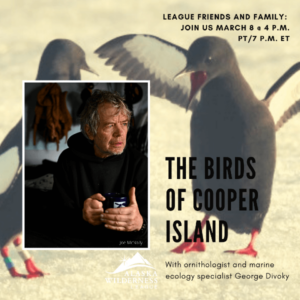 In 1972, George found a colony of Black Guillemots on Cooper Island, a barrier island in the Alaskan Beaufort Sea and began an ongoing long-term study of the colony in 1975. His nearly half-century of summers camping on the island have allowed him to witness major changes to a rapidly disappearing ecosystem. Join us to learn more about this fascinating project and how educators around the world have been inspired to share George’s learnings to encourage action on climate.
In 1972, George found a colony of Black Guillemots on Cooper Island, a barrier island in the Alaskan Beaufort Sea and began an ongoing long-term study of the colony in 1975. His nearly half-century of summers camping on the island have allowed him to witness major changes to a rapidly disappearing ecosystem. Join us to learn more about this fascinating project and how educators around the world have been inspired to share George’s learnings to encourage action on climate.
George Divoky has studied Alaskan seabirds since 1970 when, as a Research Associate at the Smithsonian Institution, he participated in a three-year census of marine birds and mammals in response to the discovery of oil at Prudhoe Bay. In 1975 he began a study of Mandt's Black Guillemots, an ice-obligate seabird, on Cooper Island, 35 km east of Point Barrow, Alaska. The study, now 47 years in duration, is the longest continuous seabird study in the Arctic and its findings on the consequences of decadal-scale reductions in snow and sea ice to seabird demographics and breeding provide some of the best examples of the long-term biological consequences of climate change.
Divoky's research on the Black Guillemots of Cooper Island was featured in a cover story in the New York Times Magazine entitled “George Divoky's Planet,” in the PBS's Scientific American Frontiers program “Hot Times in Alaska” with Alan Alda, and on ABC Nightly News and Nightline. He has appeared on The Late Show with David Letterman, and has been interviewed on NPR's Talk of the Nation, On Point and Science Friday. His research and experiences on Cooper Island were featured in a play about climate change, Greenland, staged by the Royal National Theatre in London in 2011.
February 8, 2022: Polar Bears on the Edge with Steven Kazlowski
Watch the episode here
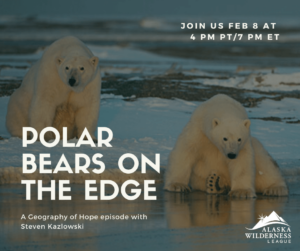 Join us for a conversation with internationally renowned photographer Steven Kazlowski. In this epic Geography of Hope episode, we hear firsthand accounts and enjoy stunning photographs of his adventures with polar bears in the Arctic. Author of “The Last Polar Bear: Facing the Truth of a Warming World" and "Ice Bear: The Arctic World of Polar Bears,” Steven Kazlowski is a wildlife photographer who has extensively photographed polar bears and their critical Arctic coastal habitat, something he will to continue throughout the international Arctic — an area rapidly being affected by climate change.
Join us for a conversation with internationally renowned photographer Steven Kazlowski. In this epic Geography of Hope episode, we hear firsthand accounts and enjoy stunning photographs of his adventures with polar bears in the Arctic. Author of “The Last Polar Bear: Facing the Truth of a Warming World" and "Ice Bear: The Arctic World of Polar Bears,” Steven Kazlowski is a wildlife photographer who has extensively photographed polar bears and their critical Arctic coastal habitat, something he will to continue throughout the international Arctic — an area rapidly being affected by climate change.
Kazlowski has traveled to the remote Beaufort and Chukchi seas in the Arctic Ocean, from Point Hope in western Alaska to Herschel Island in the Yukon, to photograph the magnificent polar bears and record the intricacies of this delicately balanced ecosystem. In this Geography of Hope episode, you'll hear anecdotes of life among the bears and acquire more in-depth understanding of the scientific, political and social issues that surround climate change.
Kazlowski is known within the photography community for his skills of observation and his determination to capture an image even in extreme weather conditions. Kazlowski lives and travels frequently from Washington to Alaska, photographing the natural world. A major supporter of Alaska Wilderness League, Steven's photographs have been featured in Audubon, Backpacking, Canadian National Geographic, National Geographic for Kids, National Wildlife, Sierra and TIME magazines.
January 25, 2022: A Thousands Trails Home with Seth Kantner
Watch the episode here
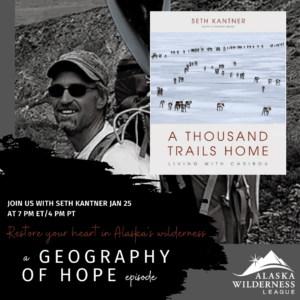 Join Alaska Wilderness League and author Seth Kantner to hear stories from his new book, a stunningly lyrical firsthand account of a life spent hunting, studying and living alongside caribou. “A Thousand Trails Home” encompasses the historical past and present day, revealing the fragile intertwined lives of people and animals surviving on an uncertain landscape of cultural and climatic change sweeping the Alaska Arctic. Seth's stories vividly highlight the interconnectedness of the Iñupiat of Northwest Alaska, the Western Arctic caribou herd, and the larger Arctic region. This tale has global relevance as it takes place in one of the largest remaining intact wilderness ecosystems on the planet and ground zero for climate change in the U.S. Audience members will hear about the politics of caribou, race relations, urban versus rural demands, subsistence versus sport hunting, and cultural priorities versus resource extraction.
Join Alaska Wilderness League and author Seth Kantner to hear stories from his new book, a stunningly lyrical firsthand account of a life spent hunting, studying and living alongside caribou. “A Thousand Trails Home” encompasses the historical past and present day, revealing the fragile intertwined lives of people and animals surviving on an uncertain landscape of cultural and climatic change sweeping the Alaska Arctic. Seth's stories vividly highlight the interconnectedness of the Iñupiat of Northwest Alaska, the Western Arctic caribou herd, and the larger Arctic region. This tale has global relevance as it takes place in one of the largest remaining intact wilderness ecosystems on the planet and ground zero for climate change in the U.S. Audience members will hear about the politics of caribou, race relations, urban versus rural demands, subsistence versus sport hunting, and cultural priorities versus resource extraction.
About the author: Seth Kantner was born and raised in northern Alaska and has worked as a trapper, wilderness guide, wildlife photographer, gardening teacher, and adjunct professor. His writing has appeared in The New York Times, Outside, Orion, and Smithsonian Magazine. Kantner is the author of the award-winning novel “Ordinary Wolves,” the memoir “Shopping for Porcupine,” and a collection of essays entitled “Swallowed by the Great Land: And Other Dispatches from Alaska's Frontier.” He has been a commercial fisherman in Kotzebue Sound for more than four decades and lives in the Northwest Arctic.
November 2, 2021: Love is King and Operation Roam’s inaugural expedition to the Arctic National Wildlife Refuge
Watch the episode here
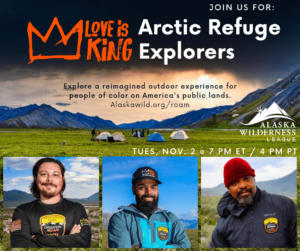 Chad Brown, Alaska Wilderness League board member and founder of Soul River Inc, recently launched a new non-profit, Love is King. The organization aims to eliminate fear and establish safety for Black, Indigenous, and all people of color while on our public lands and is committed to creating a reimagined outdoor environment focused on participation, representation and inspiration. Hear from participants of Operation ROAM’s inaugural expedition to the Arctic National Wildlife Refuge.
Chad Brown, Alaska Wilderness League board member and founder of Soul River Inc, recently launched a new non-profit, Love is King. The organization aims to eliminate fear and establish safety for Black, Indigenous, and all people of color while on our public lands and is committed to creating a reimagined outdoor environment focused on participation, representation and inspiration. Hear from participants of Operation ROAM’s inaugural expedition to the Arctic National Wildlife Refuge.
October 19, 2021: Trailblaze 120 Miles of Alaska Wilderness — An Artistic Multi-Media Journey with Max Romey
Watch the episode here
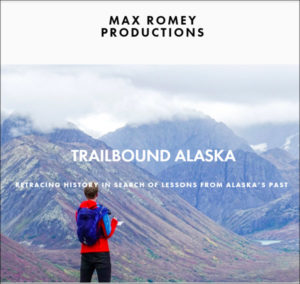 After years of struggling to see the big picture in a world that prioritizes the written word, dyslexic filmmaker Max Romey found a new artistic lens with which he could better understand the world and his role in helping to protect and celebrate its beauty. In this episode, Max will share his unique connection to the Alaska wilderness and how his journey along a 150-mile forgotten trail helped shape his purpose. You’ll enjoy private sketchbooks, public videos and personal anecdotes that highlight his experiences and efforts to educate people about the beauty of Alaska and the impacts of climate change.
After years of struggling to see the big picture in a world that prioritizes the written word, dyslexic filmmaker Max Romey found a new artistic lens with which he could better understand the world and his role in helping to protect and celebrate its beauty. In this episode, Max will share his unique connection to the Alaska wilderness and how his journey along a 150-mile forgotten trail helped shape his purpose. You’ll enjoy private sketchbooks, public videos and personal anecdotes that highlight his experiences and efforts to educate people about the beauty of Alaska and the impacts of climate change.
September 28, 2021: Tongass Odyssey — Seeing the Forest Ecosystem Through the Politics of Trees
Watch the episode here
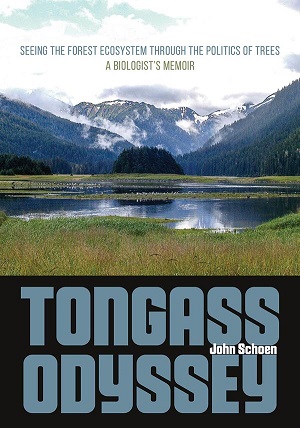 John Schoen, biologist and author of “Tongass Odyssey: Seeing the Forest Ecosystem Through the Politics of Trees,” will pair images from the field with a discussion of his memoir of firsthand experiences from the past four decades studying brown bears, deer and mountain goats, and advocating for conservation of Alaska’s Tongass National Forest. Together we will enjoy personal and family anecdotes from his field research, unpack a little of the prickly politics of the Tongass, and have a chance to ask questions about his experiences.
John Schoen, biologist and author of “Tongass Odyssey: Seeing the Forest Ecosystem Through the Politics of Trees,” will pair images from the field with a discussion of his memoir of firsthand experiences from the past four decades studying brown bears, deer and mountain goats, and advocating for conservation of Alaska’s Tongass National Forest. Together we will enjoy personal and family anecdotes from his field research, unpack a little of the prickly politics of the Tongass, and have a chance to ask questions about his experiences.
John Schoen grew up on an island in the state of Washington and received his Ph.D. from the University of Washington. He has been engaged in Alaska wildlife conservation science for more than 45 years, including 20 years with the Alaska Department of Fish and Game and 14 years with Audubon Alaska. His research into Alaska has included ecological studies of brown bears, black-tailed deer and mountain goats in Southeast Alaska’s temperate rainforest. He has also served as an affiliate professor of wildlife biology at the University of Alaska (Fairbanks). John has published more than 50 scientific and popular articles on Alaska wildlife issues and was co-editor and co-author of “North Pacific Temperate Rainforests: Ecology and Conservation” (2013, University of Washington Press). In 2020, the University of Alaska Press published his book “Tongass Odyssey: Seeing the Forest Ecosystem through the Politics of Trees.”
June 15, 2021: The Salmon Way — An Alaska State of Mind with Amy Gulick
Watch the episode here
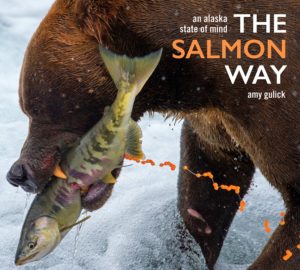 Intrigued that there are still places in the world where the lives of people and wild salmon are linked, photographer and author Amy Gulick traveled throughout Alaska to explore the web of human relationships that revolve around these extraordinary fish for The Salmon Way. Commercial fishermen took her on as crew; Alaska Native families taught her the art of preserving fish and culture; and sport fishing guides showed her where to cast her line as well as her mind. Alaskans everywhere shared their salmon riches with her in their kitchens, cabins and fish camps — it’s the salmon way. Along the way, Gulick learns that salmon are so much more than fish — they can connect people to a place, a community and to each other.
Intrigued that there are still places in the world where the lives of people and wild salmon are linked, photographer and author Amy Gulick traveled throughout Alaska to explore the web of human relationships that revolve around these extraordinary fish for The Salmon Way. Commercial fishermen took her on as crew; Alaska Native families taught her the art of preserving fish and culture; and sport fishing guides showed her where to cast her line as well as her mind. Alaskans everywhere shared their salmon riches with her in their kitchens, cabins and fish camps — it’s the salmon way. Along the way, Gulick learns that salmon are so much more than fish — they can connect people to a place, a community and to each other.
Amy Gulick is an award-winning nature photographer and writer, and a fellow with the International League of Conservation Photographers. Her images and stories have been featured in Audubon, National Wildlife, Sierra, Outdoor Photographer, The New Republic and other publications. Her work in Alaska has received numerous honors including the prestigious Daniel Housberg Wilderness Image Award for excellence in still photography, film or video from the Alaska Conservation Foundation; the Voice of the Wild Award from the Alaska Wilderness League; a Lowell Thomas Award from the Society of American Travel Writers Foundation; and a Philip Hyde Grant Award from the North American Nature Photography Association. Her previous book, “Salmon in the Trees: Life in Alaska’s Tongass Rain Forest,” won an Independent Publisher Book Award and two Nautilus Book Awards.
June 8, 2021: Silences So Deep — Music, Solitude, Alaska with John Luther Adams
Watch the episode here
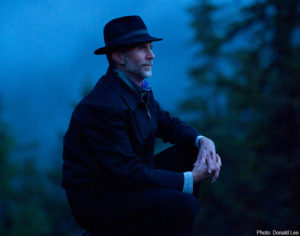 In the summer of 1975, composer John Luther Adams, then a twenty-two-year-old graduate of California Institute of the Arts, boarded a flight to Alaska. So began a journey into the mountains, forests and tundra of the far north — and across distinctive mental and aural terrain — that would last for the next forty years. In this Geography of Hope episode, you will hear about John’s special connection with Alaska, what it’s like to live alone in the frozen woods, composing music by day and spending one’s evenings with a raucous crew of poets, philosophers and fishermen. Inspired by his latest book, “Silences So Deep,” we’re sure you’ll enjoy this special treat.
In the summer of 1975, composer John Luther Adams, then a twenty-two-year-old graduate of California Institute of the Arts, boarded a flight to Alaska. So began a journey into the mountains, forests and tundra of the far north — and across distinctive mental and aural terrain — that would last for the next forty years. In this Geography of Hope episode, you will hear about John’s special connection with Alaska, what it’s like to live alone in the frozen woods, composing music by day and spending one’s evenings with a raucous crew of poets, philosophers and fishermen. Inspired by his latest book, “Silences So Deep,” we’re sure you’ll enjoy this special treat.
To learn more about Mr. Adams, visit his website here.
Purchase Mr. Adams new memoir here.
May 25, 2021: Explore a Hidden Gem of the Western Arctic, with Rosemary Ahtuangaruak and Debbie Miller
Watch the episode here
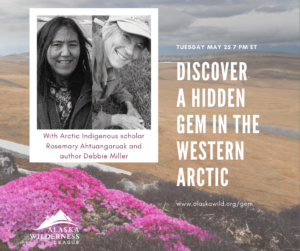
Though many have heard of Alaska public lands like the Tongass National Forest, Denali National Park or Arctic National Wildlife Refuge, fewer are familiar with a hidden gem in the western Arctic where a treasure trove of wild Alaska experiences awaits. The unfortunately-named National Petroleum Reserve-Alaska was first created as a naval petroleum reserve following World War I but was transferred to the Interior Department for oversight in 1976 and essentially remained as untouched wilderness into the 1990s. These lands have supported Alaska Native communities for thousands of years, including the ancestors of guest speaker Dr. Rosemary Ahtuangaruak, a community health aide and Arctic Indigenous scholar from Nuiqsut, Alaska.
Rosemary has held several local leadership positions and is an advocate of community rights considering the oil development occurring near her village. The Reserve's land and wildlife continues to sustain her village while simultaneously providing millions of acres of critical habitat for migratory birds, brown bears, caribou, threatened polar bears, walrus, endangered beluga whales and more. Some of this magnificent wildlife has been featured in the book “On Arctic Ground” by renowned author and League board member Debbie Miller. We hope you can join us as we welcome Rosemary and Debbie for an enlightening hour about the wonders and struggles within the western Arctic. In addition to Rosemary's reflections on protecting the Reserve from unrelenting oil drilling, you'll see powerful images from Debbie's riveting photo-essay book focused on the region, hear how she first met Rosemary, and enjoy other personal stories that cover more than 600 miles of arctic exploration traveling by canoe and on foot along four of the Reserve's wild rivers.
April 21, 2021: Earth Week Special — How Grassroots Efforts have Protected the Arctic Refuge
Watch the episode here
Join us for an Earth Week extravaganza as we celebrate the grassroots efforts that have helped protect the Arctic Refuge from drilling for the past 25+ years. We will be joined by activist and film producer Miho Aida, author and Trent University professor Finis Dunaway and social media influencer Alex Haraus highlighting the improbable story of how the people like you successfully defended the Arctic Refuge for decades.
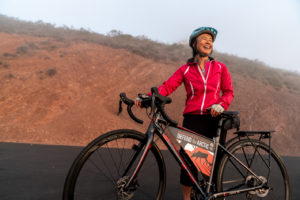 MIHO AIDA is an athlete, advocate, author and film producer who has taken her award-winning film, “The Sacred Place Where Life Begins: Gwich’in Women Speak,” on bicycle film tours, riding more than 3,000 miles across the country and amplifying the voice of the Gwich’in people calling for permanent protection of the sacred coastal plain of the Arctic National Wildlife Refuge. Miho advocates for outdoor adventures that are rooted in environmental activism in solidarity with traditionally marginalized communities. She was featured as one of the world’s most adventurous women 2019 in Men’s Journal, as well as the recipient of 2018 NOLS Alumni Achievement Award and the 2017 SHIFT Adventure Athlete Award that recognizes the adventure athlete of the year who best promotes conservation leadership in the United States.
MIHO AIDA is an athlete, advocate, author and film producer who has taken her award-winning film, “The Sacred Place Where Life Begins: Gwich’in Women Speak,” on bicycle film tours, riding more than 3,000 miles across the country and amplifying the voice of the Gwich’in people calling for permanent protection of the sacred coastal plain of the Arctic National Wildlife Refuge. Miho advocates for outdoor adventures that are rooted in environmental activism in solidarity with traditionally marginalized communities. She was featured as one of the world’s most adventurous women 2019 in Men’s Journal, as well as the recipient of 2018 NOLS Alumni Achievement Award and the 2017 SHIFT Adventure Athlete Award that recognizes the adventure athlete of the year who best promotes conservation leadership in the United States.
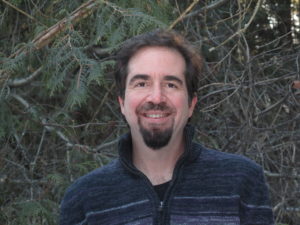 FINIS DUNAWAY is professor of history at Trent University in Peterborough, Ontario. He is the author of “Seeing Green: The Use and Abuse of American Environmental Images,” which received the John G. Cawelti Award from the Popular Culture Association/American Cultural Association. Finis has spent the past several years researching the history of the Arctic Refuge struggle, including interviewing Gwich’in leaders, scientists, and environmental activists across the continent. He recently wrote a piece for the Washington Post about how the Gwich’in Nation transformed the refuge debate into a struggle for Indigenous rights and environmental justice. His new book is “Defending the Arctic Refuge: A Photographer, an Indigenous Nation, and a Fight for Environmental Justice”—a story of this epic political battle told from the perspective of the grassroots.
FINIS DUNAWAY is professor of history at Trent University in Peterborough, Ontario. He is the author of “Seeing Green: The Use and Abuse of American Environmental Images,” which received the John G. Cawelti Award from the Popular Culture Association/American Cultural Association. Finis has spent the past several years researching the history of the Arctic Refuge struggle, including interviewing Gwich’in leaders, scientists, and environmental activists across the continent. He recently wrote a piece for the Washington Post about how the Gwich’in Nation transformed the refuge debate into a struggle for Indigenous rights and environmental justice. His new book is “Defending the Arctic Refuge: A Photographer, an Indigenous Nation, and a Fight for Environmental Justice”—a story of this epic political battle told from the perspective of the grassroots.
ALE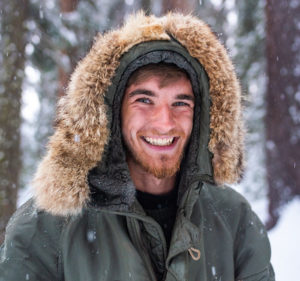 X HARAUS is a climate change communicator and backcountry conservationist that lives on the road full-time. He documents and shares his adventurous lifestyle on social media as a hook to encourage audiences to develop an emotional attachment to nature, experience it for themselves and take action to protect it. Most recently, he played an integral role in the fight to save the Arctic National Wildlife Refuge, using TikTok to garner more than 6 million public comments to the U.S. Fish and Wildlife Service in opposition to seismic exploration on the Arctic Refuge coastal plain. This was more participation in just three weeks than any other single public comment period on an environmental rule or permit had received prior.
X HARAUS is a climate change communicator and backcountry conservationist that lives on the road full-time. He documents and shares his adventurous lifestyle on social media as a hook to encourage audiences to develop an emotional attachment to nature, experience it for themselves and take action to protect it. Most recently, he played an integral role in the fight to save the Arctic National Wildlife Refuge, using TikTok to garner more than 6 million public comments to the U.S. Fish and Wildlife Service in opposition to seismic exploration on the Arctic Refuge coastal plain. This was more participation in just three weeks than any other single public comment period on an environmental rule or permit had received prior.
April 6, 2021: Alaska’s Land, Its People and Global Evolution — An Artist’s Perspective
Watch the episode here
What does Alaska have to share with the world? Through the artist’s perspective, guests Lindsay Carron and Polly Andrews describe the special qualities of Alaska’s land and people that connect us to the earth and its evolution.
NAPIRYUK POLLY ANDREWS (right) is Cup’ik from the villages of Chevak and Lower Kalskag in Southwest Alaska. She is currently pursuing a Master's in Education, with a focus on creating culturally responsive connections to enhance perspectives and positive outcomes between Native and non-Native professionals and community. Additionally, Polly enjoys sharing Cup’ik culture and performing arts through song, dance, story, and spoken word. Today, Polly is mom to three lively children, and their favorite past time includes returning to the village for fish camp and subsistence activities.
LINDSAY CARRON (left) is an artist and educator residing in both Los Angeles and Alaska. In Los Angeles, she works with young children in nature-based learning as a mentor with EverWild. She partners with her local community on murals and creative assets for reducing our environmental footprint. In Alaska, Lindsay has worked for the past five years as an artist in residence with the U.S. Fish and Wildlife Service in Alaska’s 16 national wildlife refuges. She has also illustrated children’s books with Sealaska Heritage Institute, and taught classes and exhibited her art in Juneau. Her travels have taken her to incredible lands where she has met inspiring people and learned about rich cultural traditions, and these experiences provide the foundation of her cross-cultural and collaborative work with various organizations.
March 16, 2021: Photographic Inspiration in the Arctic National Wildlife Refuge with Chad Brown
Watch the episode here
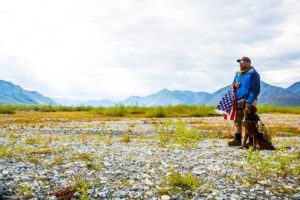
Chad Brown is an accomplished portrait and adventure photographer, creative director and conservationist. Hear about his visits with local Indigenous communities, the humbling impact of moving silently through a vast open space, and how immersing himself in wilderness has helped him to treat his post-traumatic stress disorder related to military tours in Iraq and Somalia. In this Geography of Hope episode, Chad shares the magic from his journeys to the Arctic, both on his own and with the nonprofit he founded, Soul River Inc. These trips carried a medicinal-like quality, one that helped to heal the soul and mind. The Arctic Refuge is where Chad realized why the Gwich'in people call its coastal plain Iizhik Gwats’an Gwandaii Goodlit — The Sacred Place Where Life Begins. Read more about Chad's explorations.
Chad studied communication design and photography at American Intercontinental University before earning his Masters of Science in communication design at the Pratt Institute in NYC. He now resides in Portland, Oregon, where he runs Soul River Inc., the nonprofit organization he founded that brings together at-risk youth and veterans as mentors and takes them into threatened wild spaces, providing mission-driven experiences where advocacy and outdoor education meet. This work has led him to Capitol Hill, advocating for our public lands and wild places, bringing youth leaders of tomorrow and giving them an opportunity to interface with congressional members. He is also a board member of the National Wildlife Refuge Association and Alaska Wilderness League.
Chad has been featured on BBC and CBS, as well as in national publications such as Outside Magazine and The Drake, and in various Pacific Northwest publications. He was the first recipient of the Breaking Barriers Award Presented by Orvis, as well as the Bending Toward Justice Award from Oregon Senator Jeff Merkley.
March 2, 2021: A Shape in the Dark: Living and Dying with Brown Bears
Watch the episode here
In “A Shape in the Dark,” Bjorn Dihle blends personal experience with historical and contemporary accounts to fully explore the world of brown bears, from frightening attacks to the animal’s place in Native cultures to the ways habitat degradation and climate change are threatening the species. “A Shape in the Dark” is an elegant and lyrical work that thoughtfully weaves outdoor adventure, natural history and memoir together to present a fresh and vivid portrayal of these fascinating creatures.
BJORN DIHLE is a wilderness and wildlife film guide as well as a contributing editor for Alaska Magazine and Hunt Alaska Magazine, and has been published in Outdoor Life and Sierra Magazine, among others. He is the author of two previous books, “Haunted Inside Passage: Ghosts, Mysteries, and Legends of Southeast Alaska” and “Never Cry Halibut: And Other Alaska Hunting and Fishing Tales.” He lives on Douglas Island in Southeast Alaska with his family.
DREW HAMILTON is an award-winning photographer and bear viewing guide. As president of the board for Friends of McNeil River, Drew fights for conservation of brown bears so that future generations can enjoy this most charismatic of megafauna. For Drew, bears occupy an important role at the intersection of ecology and economics in the state of Alaska, and their conservation is vital to our own future.
*MEMBER EXCLUSIVE* February 23, 2021: Chasing Winter with Debbie Moderow
Become a member here
Debbie Clarke Moderow, author of "Fast into the Night" will tell stories about her adventures with sled dogs in the context of a warming world. Debbie's journey informs and inspires her presentation about the threat of climate change that is particularly evident in wild Alaska, and what is at stake for us all.
Debbie Clarke Moderow and her husband Mark live in Anchorage and Denali Park, Alaska. Debbie received a BA from Princeton University in 1977, and an MFA in Creative Writing at Pacific Lutheran University in 2013. She ran the Iditarod Trail Sled Dog Race in 2003 and 2005, completing the race on her second attempt. Part adventure, part love story, part inquiry into the mystery of the connection between humans and dogs, Debbie's memoir won the 2016 National Outdoor Book Award for Outdoor Literature and the 2017 WILLA Award in Creative Nonfiction.
Debbie's writing explores her deep and lifelong bonds with animals and wild places. She was named Artist in Residence for Gates of the Arctic National Park in 2019, and is currently participating in a National Science Foundation-funded arts-science-humanities collaboration through the University of Alaska called "In a Time of Change: Boreal Forest Stories." Her current work focuses on her relationship to landscape in the context of change.
September 30, 2020: Sneak peek into "The Arctic: Our Last Great Wilderness" with Florian Schulz
Watch the episode here
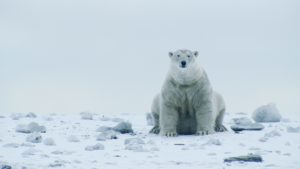 Alaska Wilderness League presents award-winning photographer and cinematographer, Florian Schulz. Florian and Tom Campion, founder of the Campion Foundation and tireless advocate for the Arctic National Wildlife Refuge, will take attendees to the refuge through Florian’s award-winning photos, plus you’ll get a sneak peek into their latest collaboration, a new big screen film set for release in 2021 called “The Arctic: Our Last Great Wilderness.” Together, we will explore a land that has evolved intact and untamed since the beginning of time, a world few have truly seen.
Alaska Wilderness League presents award-winning photographer and cinematographer, Florian Schulz. Florian and Tom Campion, founder of the Campion Foundation and tireless advocate for the Arctic National Wildlife Refuge, will take attendees to the refuge through Florian’s award-winning photos, plus you’ll get a sneak peek into their latest collaboration, a new big screen film set for release in 2021 called “The Arctic: Our Last Great Wilderness.” Together, we will explore a land that has evolved intact and untamed since the beginning of time, a world few have truly seen.
FLORIAN SCHULZ is a professional wildlife and landscape photographer from Germany whose striking images have garnered international recognition. His photographs have won several awards including in the BBC Wildlife Photographer of the Year Competition and the Banff International Mountain Photography Competition. His 2005 book published by Braided River, “Freedom to Roam: Yellowstone to Yukon,” received an Independent Publisher Award and was named on its list of "Top Ten Outstanding Books of the Year," and in 2008 he was the recipient of the North American Nature Photography Association’s Vision Award. He is a National Geographic photographer and the cinematographer and co-director for a new big screen film with executive producer Tom Campion and the Campion Advocacy Fund entitled "The Arctic: Our Last Great Wilderness," to be released in 2021. Learn more about the film at www.ProtectTheArctic.org.
*MEMBER EXCLUSIVE* September 23, 2020: "A Life Among Polar Bears: Science, Research and the Climate Crisis"
Join us for an evening with Dr. Steven Amstrup, chief scientist for Polar Bears International. He will discuss the decades he has spent studying, researching and working to protect polar bears as they face increasing pressure from climate change. Alaska’s Arctic Ocean and North Slope are critical habitat for polar bears, and Dr. Amstrup will talk about what his science has revealed and the lessons he’s learned in his efforts to protect the bears and our planet, including how polar bears are not yet doomed. In fact, in the December 2010 paper issue of Nature, he and his co-authors showed that preserving polar bears is all about controlling human-caused temperature rise.
Dr. Steven Amstrup earned a B.S. in Forestry from the University of Washington (1972), a M.S. in Wildlife Management from the University of Idaho (1975), and a Ph.D. in Wildlife Management from the University of Alaska Fairbanks (1995). For 30 years prior to joining Polar Bears International, he led polar bear ecology research in Alaska. In 2007, he led a USGS research team in production of nine reports that became the basis for the 2008 decision by the U.S. Secretary of the Interior to list polar bears as a threatened species.
Older Recordings
August 25, 2020: "Raven's Witness: Lessons From a Life in Alaska’s Wilderness"
Before his death in 2019, cultural anthropologist, author, and radio producer Richard K. Nelson’s life’s work focused primarily on the Indigenous cultures of Alaska and more generally on the relationships between people and nature. He spoke both Inupiaq and Koyukon and lived for extended periods in Athabaskan and Alaskan Eskimo villages, experiences which inspired his earliest books. His close-friend and lifelong Alaskan, Hank Lentfer captures Richard's adventures and his life of learning across Alaska in his new book "Raven’s Witness." Join Hank as he shares his stories and times in Alaska’s public lands with the friend fondly referred to as "Nels."
August 5, 2020: Voices on the Forefront: Youth Climate Activists and the Fight to Protect the Arctic Refuge
Join our panel discussion featuring Gwich’in leader Jody Potts, Gwich’in Youth Steering Council member Quannah Potts, and youth activist and writer Maia Wikler. Panelists will share their experiences as advocates at the intersection of the climate crisis, human rights and the Arctic Refuge. Participants will hear firsthand how the climate crisis is impacting Alaska’s people, lands and waters, and the ongoing efforts to raise awareness and action.
May 7, 2020 at 4 p.m. (ET): Highlights from the award-winning short film “The Sacred Place Where Life Begins”
Enjoy video clips, photos and discussion with filmmaker Kristin Gates. The film follows Kristin and Jeremy as they search to find the Porcupine caribou migration in the Arctic National Wildlife Refuge, and in so doing, learn from leaders of the Gwich'in Nation about the value of their culture, the importance of the Porcupine caribou herd and its calving grounds on the Arctic Refuge coastal plain, and the continued protection of their sacred land from oil development.
May 12, 2020: The Sun is a Compass: A 4,000-mile Journey into the Alaskan Wilds with Caroline Van Hemert
Read Caroline's recent article in The New York Times here.
Caroline Van Hemert is a biologist, writer and adventurer whose journeys have taken her from the pack ice of the Arctic Ocean to the swamps of the Okavango Delta. She is the author of “The Sun is a Compass: A 4,000-mile Journey into the Alaskan Wilds,” which received the 2019 Banff Mountain Book Competition Award for Adventure Travel. Her writing has also been featured in The New York Times, Audubon Magazine, Birding, L.A. Times, Outside Magazine and more. Caroline will present a reading from her book, as well as stories and photos from her time spent trekking in Alaska.
Thursday, May 21: Michael Boardman, Arctic National Wildlife Refuge Artist-in-Residence.
Enjoy an in-depth presentation featuring images and videos from Michael Boardman, a member of the Maine Master Naturalist program and the 2019 Arctic Refuge Artist-in-Residence. In spring of 2019, the U.S. Fish and Wildlife Service selected Michael as its 2019 artist-in-residence for the Arctic Refuge, and he was flown to the coastal plain of the Arctic Refuge in June to spend two weeks along the Canning River helping ornithologists study bird migrations to the Arctic tundra. Michael will share his unique experience in an extreme environment, with plenty of artwork and stories about how the migrating birds of the Arctic Refuge connect us all to that endangered landscape.
*MEMBER EXCLUSIVE* May 23, 2020: Debbie Miller explores Prince William Sound
Debbie Miller takes us to glacier-carved fjords and lush forests in Prince William Sound, sharing images and stories from her book, "A Wild Promise: Prince William Sound" (Braided River, 2019) while guiding us through its history. Debbie will also preview a soon-to-be announced 2021 Alaska Wilderness League trip through Prince William Sound (also featuring Debbie as a special guest), offering a unique opportunity to see this amazing wilderness landscape.
*MEMBER EXCLUSIVE* May 30, 2020: Mark Titus and guests present “The Wild”
Filmmaker Mark Titus has created an exclusive access opportunity for Alaska Wilderness League members to access his amazing feature length film “The Wild” before its public release later this year. “The Wild” is an urgent call to action to protect the beauty of Bristol Bay, Alaska, and its unparalleled salmon runs — it is an examination of what it means to save what we love. For millennia, wild salmon have survived ice ages, continental shifts and most recently (and destructively), human beings. Mark's film explores their continued existence in the face of a massive mining project and provides a glint of hope under the surface of malaise we now find ourselves in.
June 2, 2020: Arctic Adventures by Land and Sea with David Thoreson
David Thoreson has spent more than a decade sailing and exploring the waters of the Arctic aboard his boat the Ocean Watch and is the only American sailor in history to transit the infamous Northwest Passage in both directions. He has spent eight days traversing the Arctic Refuge coastal plain on foot and has sailed along its coastline multiple times. Though David comes from Iowa and first ventured out to sea alongside a Minnesota farmer, he has now sailed more than 65,000 nautical miles including an 8,000-mile circumnavigation by sail of North and South America. Join us and learn more about his time spent in the Arctic Refuge and sailing Arctic waters, and the changes he has witnessed over the years in this region.
June 17, 2020: Amy Gulick takes us on a trip to the Tongass National Forest.
Join acclaimed photographer and author Amy Gulick on a journey to one of the rarest ecosystems on Earth – the Tongass rain forest of Alaska. Humpback whales, orcas, and sea lions cruise the forested shorelines. Wild salmon swim upstream into the forest, feeding some of the world's highest densities of grizzlies, black bears, and bald eagles. Native cultures and local communities benefit from the gifts of the forest and sea.
Amy Gulick's book, Salmon in the Trees: Life in Alaska's Tongass Rain Forest, is the recipient of an Independent Publisher Book Award and two Nautilus Book Awards.

